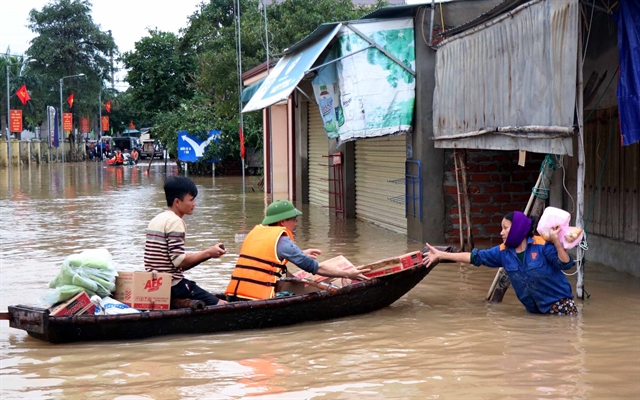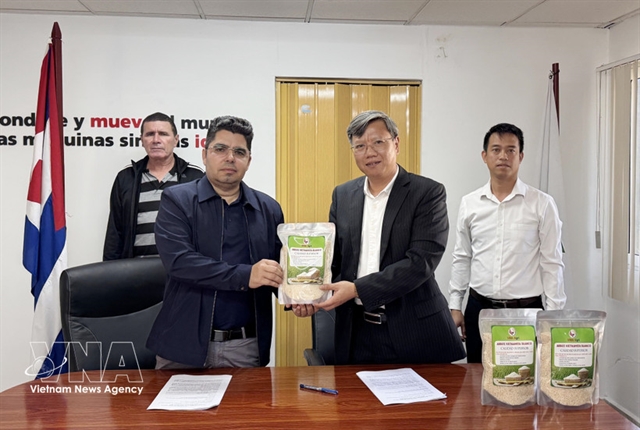 Environment
Environment


|
| People transfer goods to residents after floods in the central province of Hà Tĩnh in 2020. VNA/VNS Photo Công Tường |
HÀ NỘI — Local people need to be equipped with essential skills to cope with natural disasters, especially those in the mountainous, remote and ethnic areas, as more storms and floods are expected during the rest of this year, according to the Central Steering Committee for Natural Disaster Prevention and Control.
In the context of natural disasters and complicated developments of the COVID-19 pandemic, the committee has issued an official document, asking provinces and cities to prepare response plans and scenarios for disasters and raise awareness of local people about survival skills.
Since early this year, Việt Nam has had 53 light earthquakes, 105 hail storms and thunderstorms, 11 downpours and floods and 21 landslides.
Between January-May this year, natural disasters have claimed 21 lives, injured 29 people, damaged over 4,300 houses and destroyed over 32,000 hectares of rice and crops.
The economic loss due to natural disaster events amounted to about VNĐ119 billion in this period.
According to the National Centre for Hydro-meteorological Forecasting, it is likely that 12-14 storms and tropical depressions will occur in the South China Sea area, of which five to seven will have direct impacts on the mainland.
Floods in rivers in Yên Bái, Ninh Bình and from Quảng Bình down to Bình Thuận provinces will be at Warning Levels 2 and 3. Floods and landslides in small rivers, streams and upstream areas along with inundation in urban areas are likely to happen, according to the centre.
Natural disaster events are more likely to happen and tend to be more unpredictable, causing increasingly serious damage to production activities and people's lives.
This requires us to pay more attention to the natural disaster prevention, response and impact mitigation work in the coming time, especially in the context of the complicated developments of the COVID-19 pandemic in many localities, according to the Central Steering Committee for Natural Disaster Prevention and Control.
In order to proactively respond to the ‘double disasters’ of natural disasters and COVID-19 pandemic, the Việt Nam Disaster Management Authority has developed documents guiding localities to develop plans to respond to natural disasters.
The authority has issued a handbook for natural disaster prevention in the context of the COVID-19 pandemic, detailing specific response scenarios and plans for each region to ensure local authorities and people are aware of the safety instructions and skills needed to cope with the natural disasters amid COVID-19.
It also cooperated with other agencies to develop communication materials and publications including Infographic, television and radio programmes to help local people easily access information.
According to deputy director of Việt Nam Disaster Management Authority, Nguyễn Văn Tiến, localities should integrate COVID-19 prevention and control measures into response plans for natural disasters as well as manage to limit mass evacuation.
He said vaccinations should be prioritised for people tasked with natural disaster prevention, control, search and rescue work and people in high risk places.
Localities should also raise awareness of the public about the knowledge and skills to respond to natural disasters with special attention being given to remote, ethnic, border, and island areas.
Survival skills
The steering committee and the State Committee for Incidents and Disaster Response, and Search and Rescue recommended people regularly follow the situation of natural disasters and COVID-19 pandemic in their area (including announcements about safe shelter sites), prepare necessary items in case of having to evacuate in the event of a natural disaster (including mask, food and sanitiser).
In case of evacuation, people need to save important phone numbers such as the number of the commune’s People's Committee and local health and rescue agencies to contact in case urgent assistance is needed.
To ensure safe evacuation, people follow the instructions of the authorities and people in charge. When evacuating in the context of the COVID-19 pandemic, people need to install the Bluezone application to update news and check the status of people they have contacts with.
Upon arriving at the evacuation site, if people have signs of fever, cough, loss of taste, or fatigue, they should immediately notify people in charge and shouldn’t share food, drink, or utensils with other people as well as regularly wash hands with soap, or use alcohol sanitiser. People are also advised to avoid gathering with others.
Vaccinated people still have to comply with the 5K regulations of the Ministry of Health, and only leave the evacuation site when allowed.
Families with young children need to ensure that children are always accompanied by an adult, always keep children in sight to make sure they are not getting lost. Adults need to remind children to stay with their parents and family or need to know where their family is in case they are not together.
They are also recommended to teach their children to memorise their parents' phone numbers and contact information in case they are lost or in an emergency situation.
Families should also ensure their children wear a mask as well as have mental and emotional support for them as children can easily feel insecure during the evacuation. Adults also must pay attention to preventing accidents and injuries to children when natural disasters occur, especially drowning.
For those who don’t have to evacuate, steering committees need to instruct local people to reinforce their homes and store important furniture and items in dry and high places, turn off electricity sources to avoid having equipment damaged by high water levels.
Each family should also prepare drinking water for five to seven days and instant food, flashlights, kerosene lamps, phone chargers, among other necessary devices.
In the post disaster period, people should be supported in stabilising their life and environment cleaning as well as ensure they have clean water. — VNS




